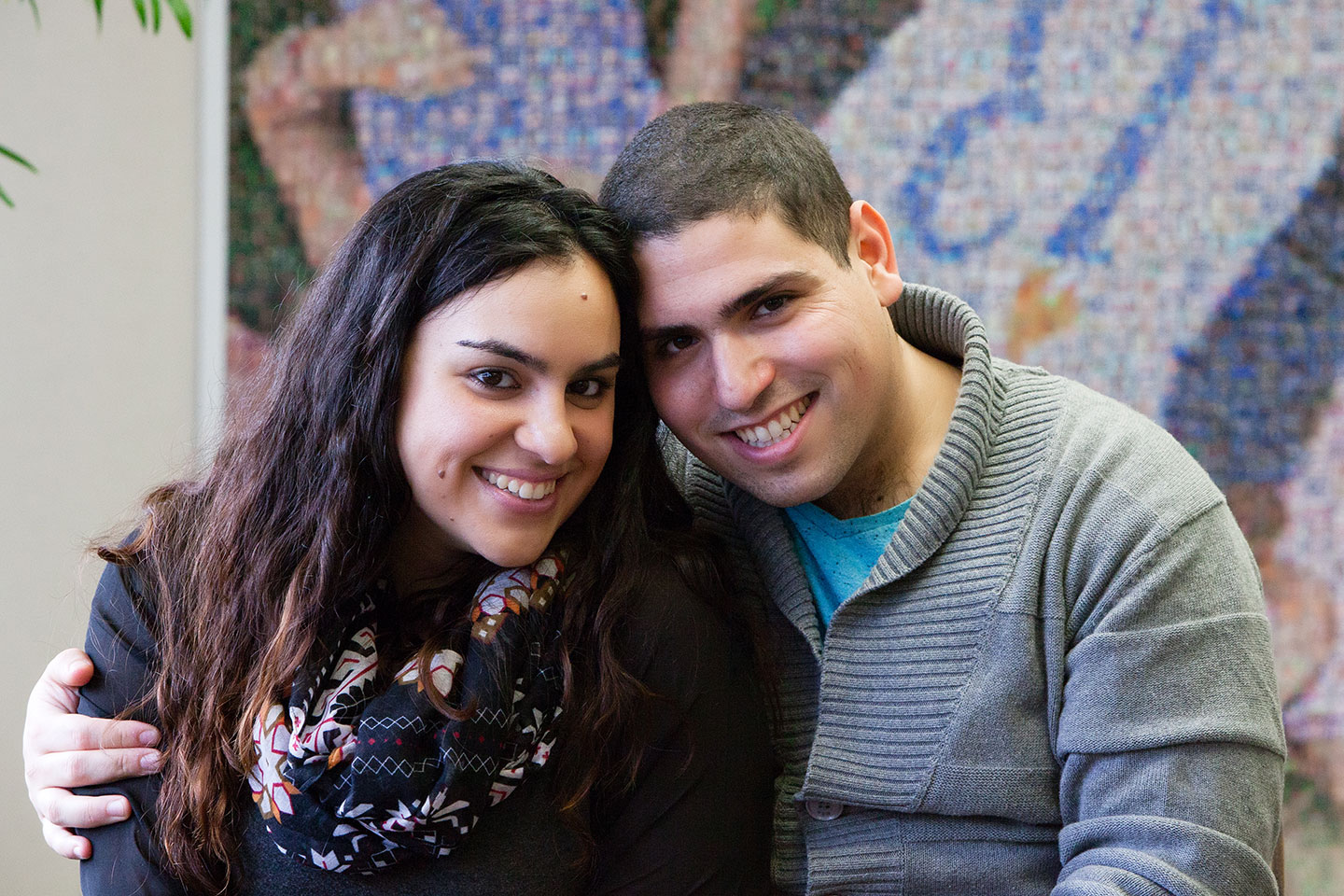Masters of Diplomacy
By Vivian Henoch, Editor myJewishDetroit
April 1, 2015
Is it true that Israelis are optimists at heart, pragmatic in their outlook on life and acutely aware of the world in its menacing scale and complexity? Or are we just fortunate to have Eviatar Baksis and Liraz Cohen as our role models, representing Israel in their service to Jewish Detroit?
It’s been the coldest winter on record in Michigan, something of a shock to Liraz and Eviatar who met at Tamarack Camps four summers ago. They were leaders for Federation’s Israeli Camper Program, and have since worked together in Federation’s Partnership 2Gether Region as facilitators for Teen Leadership Programs and bus counselors for Teen Missions and college Birthright trips. In becoming peer emissaries (shlichim) through the Jewish Agency for Israel (JAFI) a year ago, they could have taken assignments far and wide, but together they have chosen to return to Detroit – the community that has become their home away from home.
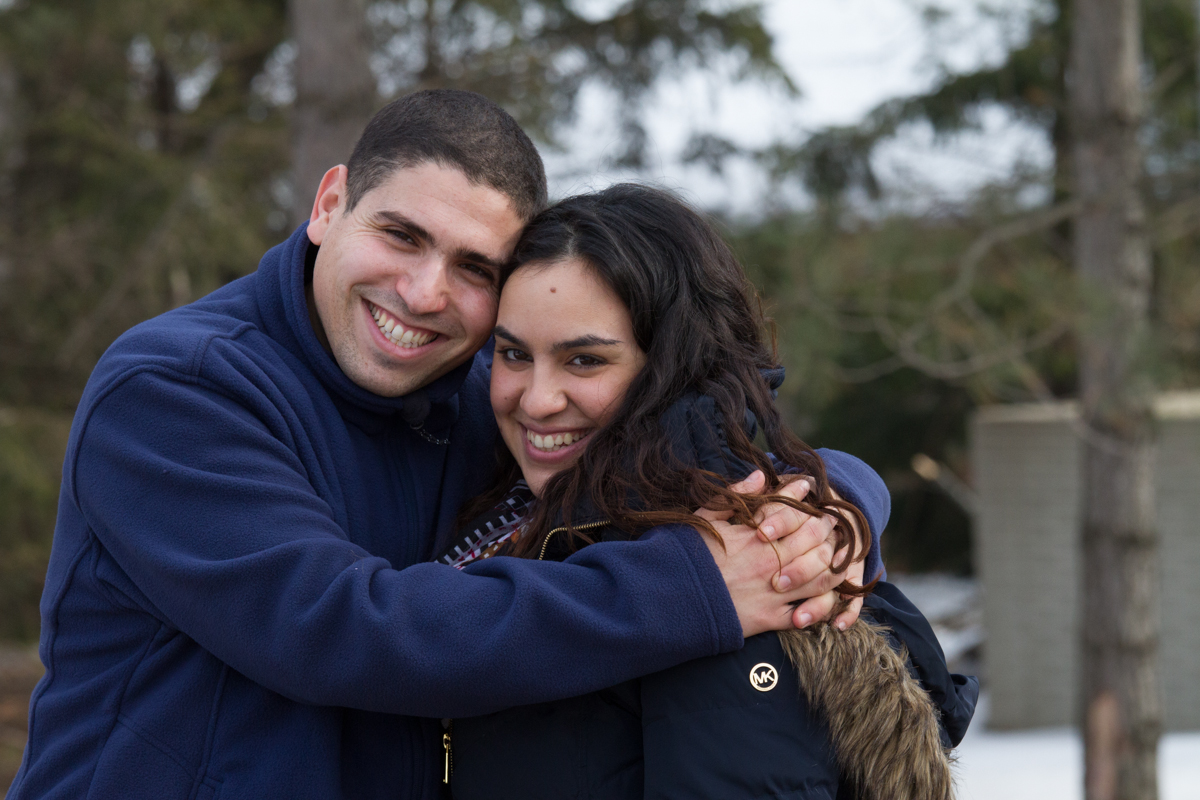
A striking matched pair with their dazzling smiles, they are often asked if they are brother and sister. Call them soul mates, partners on a mission – to put a face on Israel and to find common ground for discussion of some of the toughest issues facing young people today.
Tall orders. But Eviatar and Liraz are sabras (Israeli born), both of deep faith, high hopes and a passion for community work, well suited to life here in Detroit.
myJewishDetroit: Five words that describe you:
Eviatar: How about four words? We’re Here for Good! (Federation’s theme line.)
Liraz: Or six words: Always look on the bright side! (That’s my motto and that’s what keeps me going, even if I’m struggling.)
Eviatar: Liraz is the brighter side. I’d say I’m more realistic – or cautiously optimistic. I’m always asking myself, “What can I do better? What can we do to improve our condition?”
On family background and early influences
L: My mom is Moroccan, came to Israel in the 70’s. My Dad is Israeli-born, runs his own company. I have two siblings, a younger brother, 25, and a sister, 19, who is in the army. Our family is very close, so the hardest thing for me right now is being away from them.
I grew up in Ra’anana (about 15 miles north of Tel Aviv) – a town that someone once described for me as the West Bloomfield of Israel. It’s kind of true. Though Ra’anana is not a suburb, it’s suburban in feel with a lot of Americans and South Africans living there. I went to high school, went into the army, finished the army, and like everyone who comes out of the army, I wanted to see some of the world. So that’s how I came to Michigan with the Jewish Agency to work at Tamarack Camps where it all started.
E: Both my parents were born in Israel; like Liraz’s family, my grandparents were Moroccan. I have four siblings . . . three brothers and a sister . . . and a nephew born last June. My dad is Deputy Mayor of Migdal H’Emeck, a town of about 25,000 in Federation’s Partnership 2Gether Region where I grew up.
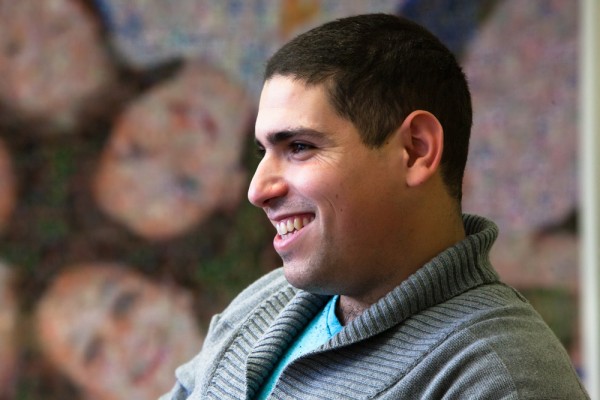
As many in our community know from visits to the Region, the socioeconomic level is different than in Central Israel. That’s why I was so happy at 13 when I was chosen to come to Tamarack with the Israeli camper program. That was a life-changing experience for me. From that point on, I knew I wanted to “live impact.” Though I didn’t know what or why exactly, I knew I wanted to find purpose and meaning in my life.
On military service
E: I served in the combat intelligence unit, where we went through training for 11 months. As part of training, we’d take these “journeys” – running ten miles with heavy gear. One of the “fun” things we’d do on the run is called “schnitzel.” You get in the water, then roll in the sand, put your gear back on and start running again. Basically, you are suffering, but calling the experience a schnitzel.
After the run, I’ll never forget the words of our commander, “You are here now, doing what you’re doing, because this is your turn in life to change the things you want to change. Your parents did it for you. And after this, your kids will do it. But it’s your turn now. The future is on your shoulders.” That was a very powerful message for me – one I carry with me to this day.
The army is really where we start to learn that our country is all about our different ethnicities and cultural backgrounds. My unit was a microcosm of the country where I learned just how diverse, colorful, interesting and amazing our society is in Israel.
L: I grew up in a bubble, living a very comfortable life where I had everything I needed and my parents were supportive. I admit I was spoiled. The army was the first time I was on my own. Most of the girls in the army opt for educational or cultural assignments, like being a cultural guide to soldiers. But I chose a different path. I wanted to be a commander, because I wanted to look back at my two years in the army and say, ‘Wow, I actually did something that transformed me and impacted others.’
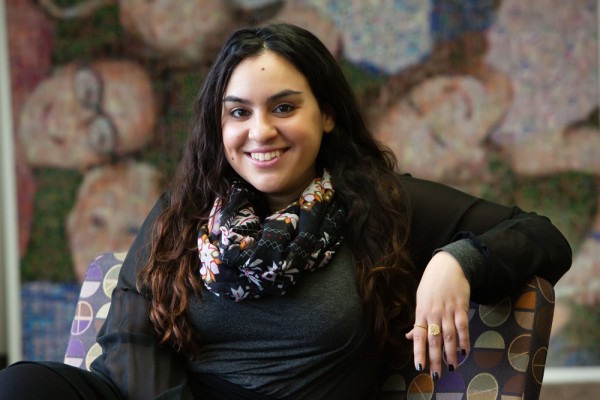
At first, none of my friends believed I’d make it through the six-month training, but of course, I did and what I learned is that when you believe in something, you do it. Hard as it was, that experience prepared me for every challenge I’ve had to face ever since.
As a Basic Training Commander for new recruits, I was their introduction to army life. Turning boys and girls into soldiers, watching them change from day one to the end of training – was an eye opening experience for me – priceless.
On diplomacy
Beyond your military training, what drew you to work as shlichim?
L: Actually, it was early on in high school when I realized this was something I wanted to do. I was selected as part of a delegation of students to come to New Jersey to attend a Jewish youth leadership conference and it was there that I discovered this global Jewish community that I knew essentially nothing about. I realized then how much work there was to do in terms of Israel advocacy. It was eye opening for me to learn about Israel in the larger view of the world.
E: I mentioned my first summer at Tamarack and speak of it often as the turning point for me. We were 300 young Israelis in America for the first time and we understood that we were representing something bigger than ourselves. That viewpoint, of course, was reinforced in the army. By the time I got to college, I knew I wanted to do something in the public service or political arena because I’ve always been interested in what’s going on in the world. Israel is such a small country. If you want to understand what’s going on in Israel, you need to understand the bigger picture.
Speaking on behalf of both of us, I’ll say that the Detroit community – the close friendships and connections we’ve made – all have played a large part in drawing us into the Jewish service realm.
L: The most import part of our work is the relationships we have and continue to create in this community, which has become our home, our extended family circle.
On campus life
Describe your current role as Hillel shlichim.
L: My work at Hillel on the University of Michigan campus is 24-7. My goal is to bring Israel to campus as a representative available to everyone – students of all religions and cultures from the whole spectrum of the political map – and to engage students who don’t even know they are interested in Israel.
What has been your biggest surprise?
L: The students have strong opinions and interest in Israel, of course. But my biggest surprise has been to see their passion and how deeply committed they are to creating a vibrant Jewish life on campus. And they’ve been unwavering in their vocal support of Israel. There are about 6,000 Jewish students on campus, and Hillel is the hub, thanks to Tilly Shames and hundreds of students investing their time and energy on our activities. On a typical Friday night, for example, we’ll get 300 to 400 people to dinner. A few months ago, we brought in Ari Shavit (acclaimed author of My Promised Israel) for a day of talks with students and an evening event that drew nearly 1,000 people in the community.
Eviatar, what are the greatest challenges as shaliach to Hillel of Metro Detroit?
E: Hillel of Metro Detroit is actually six different schools (actually multiple campuses for some of our schools) — representing a diverse student community at Wayne State, Oakland University, Oakland Community College, University of Detroit Mercy, University of Michigan Dearborn and Lawrence Technological University. Thank goodness for the leadership and organizational skills of Hillel Director, Miriam Starkman!
Our students generally are commuters. They often are working to support families past school hours, with little time for extra curricular activities or events. So their challenges are my challenges. Unlike Liraz’s work at U of M, where students already are engaged with Jewish life, my job is often starting the conversation, creating one-on-one relationships and developing leadership skills in both Jewish and non-Jewish students.
Dearborn has the largest population of Muslims out of the Middle East – and this year was the first year we did something related to Israel on campus. We brought in two professors – one Jewish and one Muslim – just to talk about the history of Israel and the Middle East conflict and try to educate from different perspectives of the story. The students’ lack of knowledge, education and their outside responsibilities – those are our biggest challenges.
What do you say to students on campus who are troubled or conflicted about Israel’s position on the settlements? How do you field the questions when students challenge you on the Palestinian situation?
E: Our goal is to raise more questions and to encourage students to learn more about the subject—as complicated as it is. Take the settlements as an example. I will show a student both sides of the coin (or even three sides), some history, and then what each side has to say about it. It’s up to each student to decide what he or she thinks about it. It’s the student’s obligation to become more educated about it. But we always need to keep in mind that no one and nothing is perfect. A real love is not a blind love, it’s when we know the good and bad and still decide to love. For me, if you are about to see what is right and wrong about Israel, you see the whole picture.
L: For me, the most important thing is that the students understand that this is their time to ask questions, to learn more and to educate themselves about everything – including Israel. They are fortunate to be in an environment that allows them to ask the hardest questions and sometimes hear some hard answers. My goal is to show the students that those who love Israel the most are often the ones who are criticizing her the most. In my opinion, this is a true love and the example that I’m trying to set for my students.
I think that they feel comfortable coming to talk to me about Israel because I allow myself to be critical of my own country.
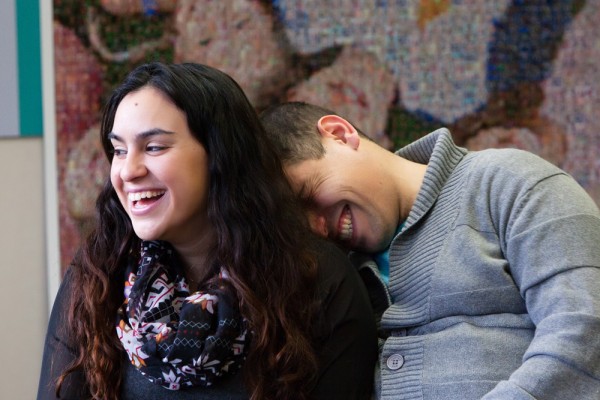
What do you love (or not) about Detroit?
E: The warm people.
L: But we can do without the cold weather.
On Israel
What you tell people considering moving to Israel?
E: I usually tell them the same things rabbis tell people considering converting to Judaism. The rule of thumb is to tell them three times no—and then see only in the fourth time if they are really interested in going ahead, I would encourage them to think (not because I don’t want them make aliyah) because living in Israel is not easy. It’s a very complicated country, the cost of living is not easy and the culture is very different than here. There’s a lot of diversity and cultural conflict inside – and across the borders we’re surrounded by our “best friends”—so living in Israel you have to know in your heart that it’s where you want to be.
L: Rather than convince people to move to Israel, our job now is bring to bring Israel here, and not bring people to Israel. It’s very important that people now understand that for Israel to stay strong we need a strong Jewish community outside of Israel. This is what we’re trying to do. Here you can find everything. But there’s no replacement for those things about home.
Favorites
Restaurant: L: The kitchen at Hillel U of M. (We both keep kosher, and Hillel is the best thing.) Amazing chef. Outside we’re vegetarian. E: Sava’s in Ann Arbor
Place to meet for coffee or drinks: Unlike other Israelis, we don’t drink coffee.
Building in the Detroit skyline: Downtown Synagogue
Place to take kids or visitors: In Israel, we’ll take them home! Both homes. Nothing like our moms’ kitchen. Here? Tamarack.
Vacation place in Israel: Jerusalem! So spiritual.
Sport(s): E: I love running, clearing my head. L: I don’t do sports . . . but shopping, is that a sport?
American Food: E: Define American food, please!? We’re Moroccan, so in terms of “Jewish food,” gefilte fish is not our thing.
Hebrew expression: E & L: Where there’s a will there’s a way. Ein davar ha’aomed, bi’fnai ha-ratzon. The best English translation is: There’s nothing that can keep you from doing what you want
אין דבר העומד בפני הרצון
English expression: E: “Actions speak louder than words.”
Never leave home without: L: I have a book of Thilim (Psalms) that my siblings gave me when I went into the army, and now I take wherever I go.
Reading now
L: My Promised Land: The Triumph and Tragedy of Israel, by Ari Shavit
E: Arik: The Life of Ariel Sharon by David Landau

